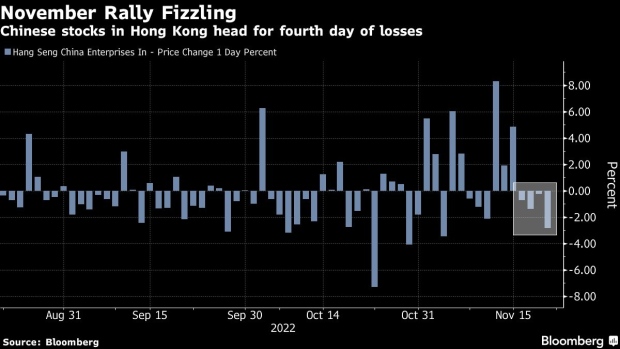Nov 20, 2022
China Stocks Slide as Covid Death, Restrictions Dent Optimism
, Bloomberg News

(Bloomberg) -- Chinese stocks and the yuan retreated as a string of reported Covid deaths and tighter restrictions in some districts gave investors a rude reminder that the path to any reopening will be rough.
The Hang Seng China Enterprises Index dropped 2% in its fourth straight session of declines, paring this month’s rally to about 22%. Reopening stocks including casinos and restaurant chains tumbled. The onshore yuan weakened 0.7% against the dollar after gaining 1.4% last week.
The setback reflects a messy reality as China seeks to pivot away from its stringent Covid Zero restrictions. Despite broad guidelines stipulating loosened quarantine and mass testing rules, worsening outbreaks across the nation are rekindling fears that authorities may have to resort to harsh restrictions to minimize the death toll.
Read: China Reopening Stocks Decline After Covid Death in Beijing
“It feels like one step forward, two steps back,” said Willer Chen, analyst at Forsyth Barr Asia Ltd. “It is super hard to reopen in the short term given winter is coming and cases are at a super high level and spreading across the whole country.”
Shijiazhuang -- a city of some 11 million and formerly rumored to be a test case for reopening -- has forbidden residents in areas deemed high risk from leaving their homes. What’s more, Beijing reported three Covid deaths over the weekend, ending months of no official fatality related to the virus.
The developments are sapping the euphoria that had boosted the nation’s assets earlier this month, when optimism over China’s gradual reopening and a rescue package for the property sector drove investors back into the market.
Morgan Stanley, Bank of America Corp. and Franklin Templeton Investments are among a growing list of strategists and money managers turning bullish on the market on the back of new-found optimism over China’s economy following heavy losses up to October.
Read: Wall Street’s Chorus of Buy China Calls Is Getting Louder
Staying Optimistic
“It is still quite messy in the early stage of reopening due to flipflop of the policy in terms of implementation on the ground,” said Tommy Xie, head of Greater China research at Oversea-Chinese Banking Corp. “However, trend of reopening is unchanged in my view.”
A Monday commentary in People’s Daily said China must firmly rectify excess curbs and prevent indiscriminate lockdowns, while authorities issued new guidelines in a follow-up to the latest instructions on optimizing Covid restrictions.
Global funds have bought around a net 39.6 billion yuan ($5.5 billion) of onshore Chinese shares so far this month via trading links with Hong Kong. That’s after net outflows of 57.3 billion yuan in October, the biggest since March 2020.
The Hang Seng Index fell 1.9% on Monday, while the onshore benchmark CSI 300 slipped 0.9%. A Bloomberg Intelligence gauge of Chinese real-estate shares trimmed losses following a statement that financial regulators have asked banks to stabilize lending to property developers and construction firms.
Meanwhile, China’s 10-year government bond yields dropped one basis point to 2.82% on Monday. China withdrew short-term cash from the financial system for the first time in nearly two weeks, as a selloff in government and corporate bonds eased.
“Though the pace of the reopening in some areas with more sever outbreaks might be slowed down, I think it won’t change the broader course of reopening,” said Zhang Yong, a fund manager at Beijing Siyuan Heng Yue Asset Management Co. “The Covid situation might impact the strength and ceiling of the rebound, but overall I’m quite optimistic and I think the bottom has passed.”
--With assistance from Wenjin Lv and April Ma.
(Updates with market close prices, statement on property financing)
©2022 Bloomberg L.P.





